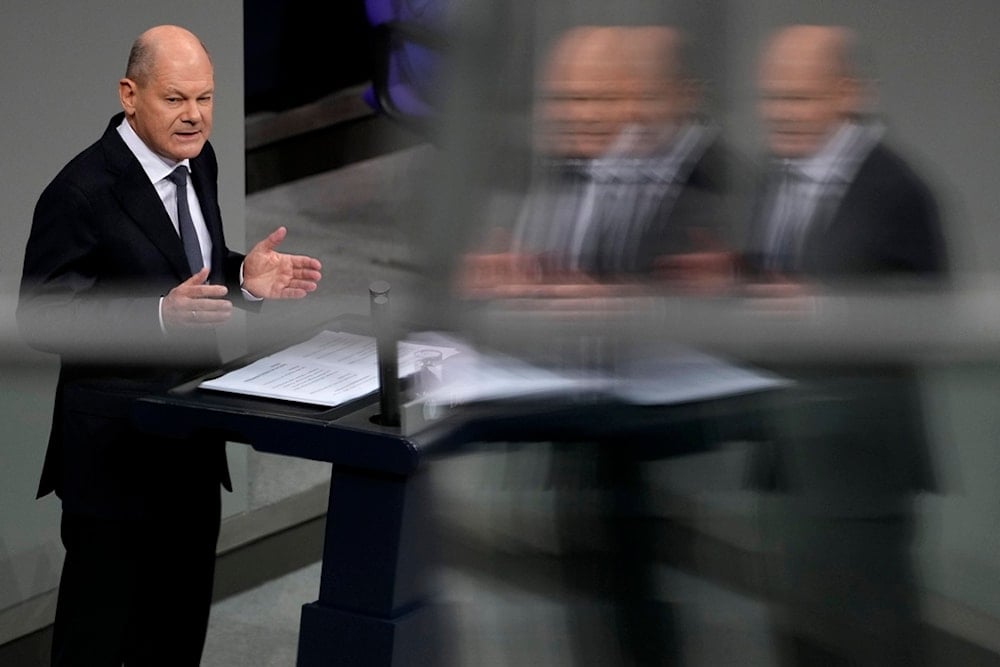Scholz loses confidence vote, early elections called
394 MPs opposed Scholz's leadership while 207 supported him and 116 abstained.
-

German Chancellor Olaf Scholz speaks during a plenary session at the German parliament where he faces a vote of confidence, Berlin, Germany, on Monday, December 16, 2024. (AP)
Germany is heading to early elections on February 23 after Chancellor Olaf Scholz lost a crucial confidence vote in the Bundestag on Monday, following weeks of political upheaval.
The vote, which Scholz had anticipated losing, paves the way for President Frank-Walter Steinmeier to dissolve parliament and officially call for new elections.
The defeat comes after the collapse of Scholz's three-party coalition government on November 6, leaving him running a minority government with the Greens.
The political turmoil has cast a shadow over Europe's largest economy, struggling with high energy prices, a sluggish economy, and geopolitical challenges such as the war in Ukraine and renewed uncertainty in NATO under a returning Donald Trump.
Confidence Vote Sparks Heated Debate
The Bundestag vote, in which 394 MPs opposed Scholz's leadership while 207 supported him and 116 abstained, followed a fiery debate that previewed the intense election campaign ahead.
Scholz, 66, defended his record, highlighting his government's increased defense spending, which he said was necessary given Russia's war in Ukraine.
"It is high time to invest powerfully and decisively in Germany," he declared, warning of the threat posed by "a highly armed nuclear power waging war in Europe just two hours' flight from here."
However, Friedrich Merz, leader of the conservative Christian Democratic Union (CDU), accused Scholz of mismanaging the economy and leaving Germany in "one of the biggest economic crises of the postwar era."
"You had your chance, but you did not use it," Merz charged. "You, Mr. Scholz, do not deserve confidence."
Read more: Instability grips US allies amid Trump's looming presidency: Axios
Coalition Collapse
The downfall of Scholz's government began when he dismissed FDP Finance Minister Christian Lindner in November, citing "weeks-long sabotage" that paralyzed the coalition.
Scholz accused Lindner and the FDP of undermining the alliance's credibility and damaging "the reputation of democracy" itself.
With the FDP out of the coalition, Scholz's government relied on the Greens, leaving it unable to pass key legislation, including a new budget. This instability fueled the opposition's push for a confidence vote, ultimately forcing Scholz's hand.
Economic and Geopolitical Challenges
The political crisis comes as Germany grapples with severe economic and geopolitical challenges.
High energy prices, tough competition and souring relations with China, and stagnant growth have battered the economy.
At the same time, Germany faces growing pressure to strengthen NATO amid the Ukraine war and uncertainty surrounding Donald Trump's return to the White House.
As his government boosted military spending, Scholz has faced criticism for failing to implement comprehensive reforms to revive the economy and address structural challenges.
What's Next?
Friedrich Merz, who has emerged as a leading candidate for chancellor, is capitalizing on Scholz's unpopularity, with polls showing the CDU leader holding a significant lead over the Social Democrats.
Merz has vowed to bring stability and restore confidence in Germany's leadership.
The February elections will determine whether Germany shifts back to a conservative government or continues with a coalition experiment.
Read more: Germany to hold snap election on February 23: Politico

 3 Min Read
3 Min Read








